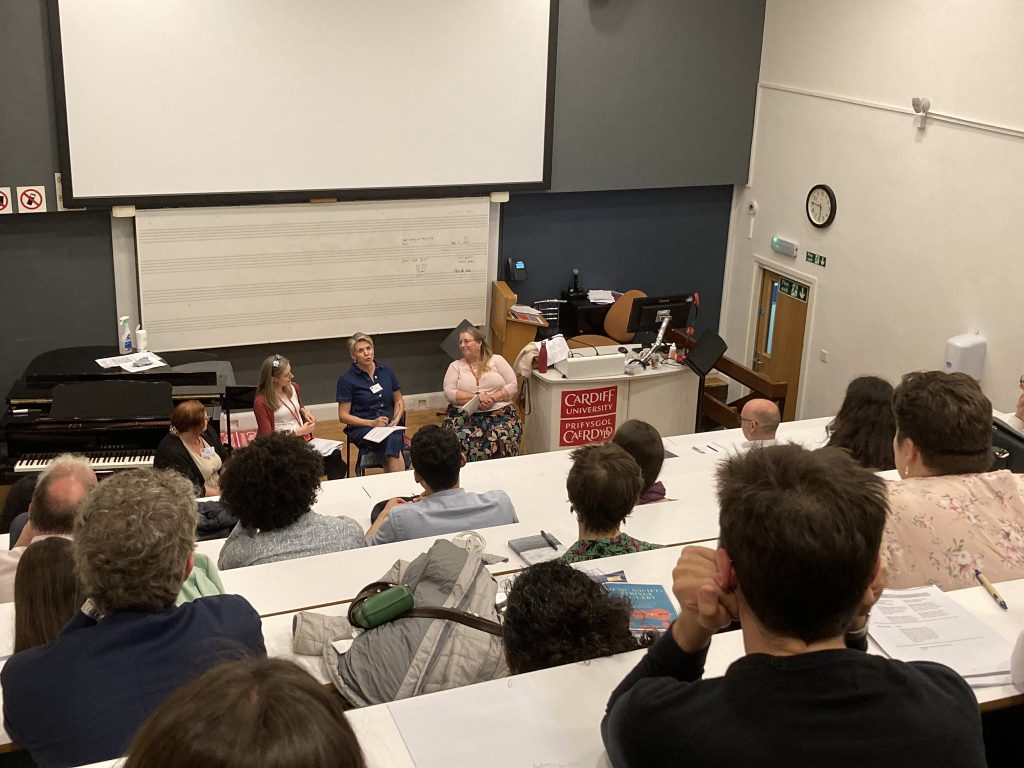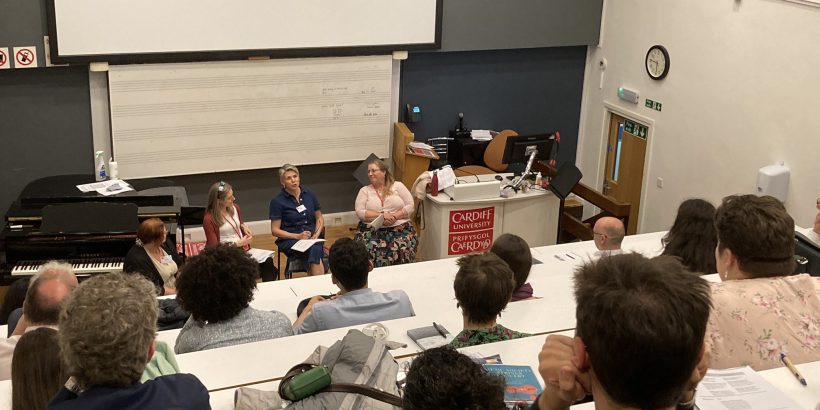Conference Report: French Music and Culture Study Day – University of Cardiff
Apolline Gouzi

The first French Music and Culture Study Day took place on sunny 10 May 2024 and was hosted by the University of Cardiff. A bilingual event, the study day showcased high-quality research output from early-career researchers working on all aspects of French music. With delegates coming from French, British, Irish and American universities, the day made for fascinating discussions about academic traditions and perceptions of French culture. Shared interest and dedication to the overlapping topics prevailed. Celebrating collegiality, the study day was a bridge-building event — both linguistically and intellectually!
After a warm welcome from conference organisers Kerry Bunkhall, Emma Kavanagh and Faith Thompson, the morning kicked off with panels on analysis and performance practice. With parallel sessions throughout the day, the event was packed full of themes, encompassing an impressive chronological period ranging from 13th century chansonniers to Isabelle Abdoulker’s opéras jeune public. If some subjects and genres — such as pianism, opera or 19th century studies — were expected, the ways in which they were dealt with showed great originality. In the opera panel, Sophie Horrocks’ captivating account of Gustave Sujol’s 1858 débuts in Bordeaux made for a nuanced example of what singing careers could look like in provincial contexts, while raising questions of performer agency. Mara Lane’s description of the voiceless — although protean — Palais-Royal ‘Pygmées’ allowed for a discussion about stage distinctions between humans, beasts and animals. In the 19th century studies panel, Collin Ziegler proposed a comparative analysis of press criticism and creative writing with the example of Édouard Dujardin.
Some recurring themes, however, would have been difficult to foresee. Hunter S. Hancock proposed a fascinating study of the 1897 Memento Musica concert in the Paris Catacombs, discussing the event’s performative quality as a culturally relevant event beyond quirk studies. Turning from the questionable macabre to the socially-acceptable tombeau, Joséphine Graffin moved to Henry Prunière’s hommage to Debussy, studying how composition style, memory and rhetorics intermingle. Finally, swiftly turning to spirituality, Jasper Schoff took on North American soundscapes, showing how early modern French ears in the New World negotiated interior listening and colonial hermeneutic in sacred contexts. On the other hand, some papers made sure that musical traditions did not stay silent; such was Ian Holt’s account of organ symphonies, as a showcase of tradition vivante.
Several papers tackled analysis. Reviving the memory of composer Rhené-Baton, Callum Siva-Rogers focused on style dépouillé, asking how composers practically achieve dépouillement in their music and more importantly, how it relates to what we perceive of it. Nana Katsia also delved into perceptions, proposing an analysis of Messiaen’s Saint François d’Assise through the lens of disability studies, showing how Modernist and medieval perspectives are closely intertwined in the composer’s opera. Performance practice and analysis were also discussed in one of the first papers of the day, focusing on Philippe Manoury’s Fractal Symmetry as the occasion to propose a method for analysis and memorisation of post-tonal piano music. Performance was in fact a guiding theme throughout the study day, with delegates discussing how practice and performance provided them with a fuller range of interpretations and meanings. André Terrell Short discussed Cécile Chaminade’s salon music as an opportunity to create new narratives around her work. The pianism panel also offered approaches based on performance-research and analysis, such as Tal Walker’s paper on Debussy’s Préludes, taking into account recording analysis, and Salome Chitaia’s lecture-recital, tracking Lisztian traces in Ravel’s pianism through the overlapping theme of water. It should be noted discussions on analysis, whether informed by performance or not, did not stay confined to the 19th and 20th century. Grégoire Bauguil’s inaugural description of Charles d’Ambleville’s 17th century musical theory, separating modes and tons psalmodiques, aptly related to Modernist discussions on modalité.
In the last two panels of the day, circulations of ideas and individuals were decidedly at the centre of considerations. In “Songs of Travel”, a paper from Ailin Arjmand explored the cultural journeys of French chansons enclosed in the pages of lute books, while Àine Palmer traced the transmissions of Melacin’s refrains as a way to explore different functions and connotations of medieval songs. In the session “Institutions and Administrations”, Apolline Gouzi also tackled circulations with the example of the trajectories of music inspectors of post-1945 France, showing how state musical criteria are shaped by common aspirations and education. The Paris Conservatoire was definitely one of these education staples, also discussed in a previous paper by Asel Akbanova. Focusing on Ambroise Thomas’ 25-year long directorate, Akbanova studied his role within the Parisian institution, discussing reforms and resistances.
Linking different generations of researchers, the day came to a close with a panel of established academics (Rachel Moore, Caroline Rae and Clair Rowden) who all provided insights into their own career paths in French music research. Reminding delegates of the importance of mutual aid as what shapes scholarly communities, the discussion then focused on the events to come. The exciting creation of the RMA French Music Study Group promises many other opportunities to share research on all things French music. The organisers announced their plan to organise an online colloquium series, and to run an annual conference in May each year. The Study Group is international in its reach and can be freely joined here. One can only look forward to the events to come!
A graduate of the Conservatoire de Paris and the École Normale Supérieure, Apolline Gouzi is currently a PhD student at the University of Cambridge, working on regional music festivals of post-1945 France. She has presented and published her research in several institutions (University of California Irvine, Paris Conservatoire, École nationale des chartes, etc.) and also works on women musicians and first-wave feminist movements in music.

